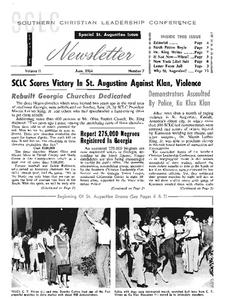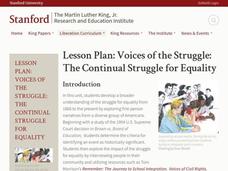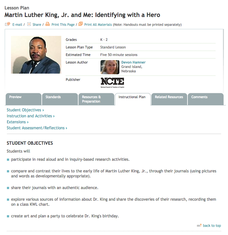Mr. Nussbaum
Martin Luther King Reading Comprehension
Boost reading comprehension with an interactive website featuring an informational passage about Martin Luther King Jr. Scholars read, or listen to, several paragraphs detailing MLK's life in order to answer seven multiple choice...
Described and Captioned Media Program
Malcolm X: Make It Plain, Part II
Track the transformation of Malcolm Little into Malcolm X and then into El Jajj Malik El-Shabazz with the second part of Make it Plain, a documentary on the famous civil rights activist. Viewers consider not only how events shaped and...
Described and Captioned Media Program
Malcolm X: Make It Plain, Part I
Malcolm X was a complicated man that few in white America understood. After sharing what they know or think they know about this civil rights leader, about nationalism and Black Nationalism, class members view a two-part documentary...
Curated OER
Martin Luther King and Malcom X on Violence and Integration
Dr. Martin Luther King and Malcolm X were contemporaries. Both were gifted orators, both were preachers, both were leaders during the Civil Rights era, both were assassinated. But the two had very different views on violence and...
Wisconsin Historical Society
Civil Disobedience
When is civil disobedience acceptable? Class members read examples of Jim Crow laws, an excerpt from Dr. Martin Luther King's "Letter from a Birmingham Jail," and a newspaper article and then consider the factors that make a law just or...
Teaching for Change
A Documents-Based Lesson on the Voting Rights Act
How did the Voting Rights Act affect the daily lives of American citizens? A document-based lesson developed by the Student Non-Violent Coordinating committee (SNCC) presents a case study of the impact of the Voting Rights Act of 1965 on...
Stockton University Wordpress
Civil Disobedience: Is it ever ok to break the law?
As part of a study of civil disobedience, class members read excerpts from the writings of activists who were willing to break the law to protest unjust laws.
University of California
Principles vs. Practices
Have you ever wondered what your own World Order would look like? Scholars use primary and secondary documents as well as video clips to investigate and analyze the Cold War. Using the sources, the principles and practices of nations...
Freedom Archives
Special St. Augustine Issue
The articles and images in the June 1964 edition of the Southern Christian Leadership Conference Newsletter detail the events in St. Augustine that were instrumental in the passing of the Civil Rights Act of 1964. The stirring images and...
Civil Rights Movement Veterans
Timeline of Events: 1960’s Civil Rights Movement of St. Augustine, Florida
A timeline can be a powerful learning tool because it reveals a pattern in events. While few would consider St. Augustine, Florida a hotbed of the 1960s Civil Rights Movement, a selection of background information and a timeline of...
PBS
March on Washington: A Time for Change
Young historians conclude their study of the events that lead up to and the planning for the March on Washington. After examining videos and primary source documents, they consider the civil rights objectives that still need to be...
Albert Shanker Institute
Dream Under Development
As part of their study of the 1963 March on Washington, class members do a side-by-side comparison of the original text of Martin Luther King's "I Have a Dream Speech" with a transcript of the speech he delivered. The take away from the...
Mr. Beem's Social Studies
Civil Rights Project: The Long Civil Rights Movement
Investigate milestones along the path that lead to the American Civil Rights Movement of the 1960s. After researching key people, events, court cases, and legislative orders, teams present their findings as a magazine, newspaper, or...
Stanford University
Lesson Plan: The Children's Crusade and the Role of Youth in the African American Freedom Struggle
Young people played significant roles in the Civil Rights movement. Class members examine the contributions of Barbara Johns, Claudette Colvin, Mary Louise Smith, and the children of Birmingham,...
Stanford University
Letter from Birmingham Jail: The Power of Nonviolent Direct Action
What strategies are most effective in changing an unjust law? Class members examine the tactics used in the Birmingham Campaign of 1963 (Project C) to achieve social justice and social transformation. After examining documents that...
Stanford University
Lesson Plan: Montgomery Bus Boycott
Most of us have heard of Rosa Parks, the Montgomery Bus Boycott, and Martin Luther King, Jr. But what about Claudette Colvin, Virginia Durr, Freedom Summer, or the Birmingham Children's Crusade? A five-lesson unit prompts class members...
Stanford University
Beyond Vietnam
On April 4, 1967 Martin Luther King, Jr. delivered his speech "Beyond Vietnam." The controversy that followed is the focus of a three-lesson unit that asks class members to consider the political and social implications of King's stance.
Stanford University
Martin Luther King, Jr. and Malcolm X: A Common Solution?
Much has been made of the differences between Martin Luther King, Jr. and Malcolm X. But was there any common ground between them? Class members reconsider what they think they know about these two civil rights leaders with biographical...
Stanford University
Voices of the Struggle: The Continual Struggle for Equality
As part of a study of the Civil Rights Movement from 1868 to the present, class members examine first person narratives, the Supreme Court case Brown v. Board of Education, and other significant events in civil rights history. They then...
Mississippi Whole School Initiative
Dream Big...With Your Eyes Wide Open
For many people, Barack Obama's presidency was the next step in Martin Luther King, Jr's dream of America's future. Explore the dreams of Americans past and present, as well as the young Americans in your class, with a set of activities...
California Education Partners
Letter From Birmingham Jail
To demonstrate their ability to comprehend complex text, ninth graders are asked to craft an essay in which they use evidence drawn from "Letter From Birmingham Jail" to analyze how Martin Luther King, Jr. uses rhetorical devices such as...
Cesar Chavez Day of Service and Learning
Cesar Chavez Curriculum Guide Day of Service and Learning
Cesar Chavez, the United Farmworker's Movement, and the struggle for Chicano Civil Rights are the focus of a Day of Service and Learning curriculum guide that asks participants to investigate the conditions, events, and attitudes that...
BrainPOP
Civil Rights Lesson Plan: Tracking History Through Timelines
Use the accompanying assessment to determine your class's prior knowledge on Martin Luther King, Jr. before beginning a lesson plan on the famous civil rights movement leader. The resource has young historians thinking about life for...
ReadWriteThink
Martin Luther King, Jr. and Me: Identifying with a Hero
Here, young historians compare their early lives to that of Dr. Martin Luther King Jr.'s. They listen to a read aloud of a story by Dr. King's sister, and then write in the provided reflective journal template. Lastly, they share their...

























